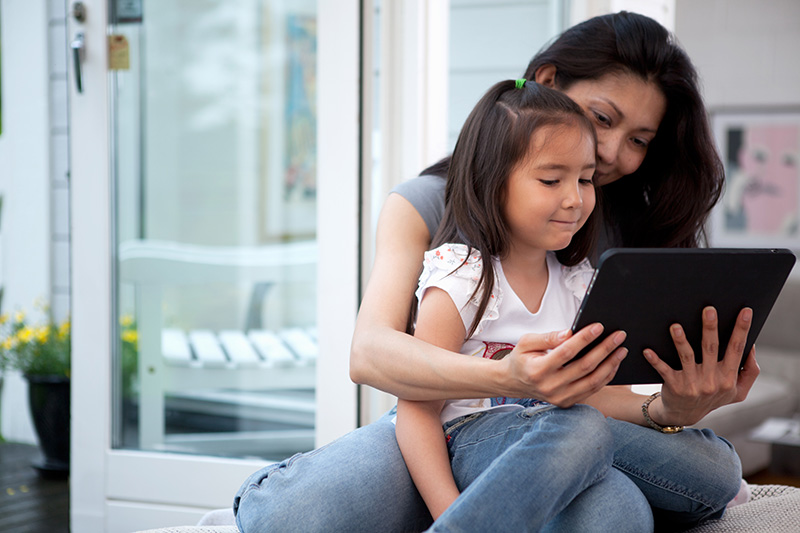It’s been a long year and families around Australia are looking forward to a well-earned break. Children and young people have had a particularly tough time in many parts of the country, with long lockdowns, remote learning and separation from family and friends.
While most parents would love their kids to spend the holidays outdoors, the reality is that many kids will be looking forward to spending more time online – gaming, chatting to their friends or playing with connected toys and devices. Cyber safety education should therefore be a part of family life. Parents and carers play an essential role in helping kids stay safe online, not just during the holidays, but throughout the year.
So how can parents provide cyber safety education at home? We’ve put together seven tips to help parents protect their kids online these school holidays.
1. Encourage responsible online behaviour
We need to raise respectful digital citizens who understand their rights and responsibilities in the digital world.
Have regular, open and honest conversations with your kids about what they see and do online, the risks to look out for and how to keep themselves and others safe. Educate children about how to spot unsolicited emails, how to deal with pop-ups and ads, and the importance of seeking advice before clicking on anything that may be suspicious. Encourage them to question what they see online, critically evaluate the media and take responsibility for what they post.

Support your child to be an upstander, and to speak up when they see cyberbullying. When kids contribute to a more positive online world, they are helping to keep themselves and others safe.
Teach your child to respect their privacy and the privacy of others. You can model this by respecting your child’s privacy, thinking carefully about the information you share and asking for their permission before posting their images on your own social media.
Ensure they know how to configure the privacy and security settings on all their games and apps, set strong passwords and keep their private information secure. You can learn more about privacy settings on popular games, apps and sites on the eSafety Guide.
2. Address the barriers to help-seeking
It is hard to overstate the importance of help-seeking when it comes to online safety. It is essential that kids have someone to talk to, no matter what has happened online.
Children and young people may be reluctant to tell you about cyberbullying or other negative online experiences for a range of reasons. They might feel embarrassed or afraid that you will be angry with them. They may be worried they will lose access to the internet or their devices. Or they may be concerned that adult intervention will make the situation worse for them.
Address these barriers by creating an environment where kids feel safe to talk about difficult feelings, fears, worries and mistakes. They need to know you will stay calm, listen and try to understand their perspective, rather than jumping straight into action. They need to feel loved and respected, no matter what mistakes they have made. Instead of punishing them, let them know you are proud of them for coming to you, give them space to talk about their feelings and concerns, and then work with them to address the problem.
Of course it’s important to set limits. But when you prioritise the relationship, they will know they can always come to you for help and support.

Ensure your child knows how to access other sources of support, such as teachers, school counsellors, wellbeing teams, GPs and psychologists, and services such as Kids Helpline and headspace. If for some reason they don’t feel comfortable talking to you, it is important that they know where else to get help.
3. Nurture their social and emotional skills
It’s important for children to build resilience and develop skills to cope with tricky online situations. The eSafety Commissioner calls this ‘digital intelligence’ – the social, emotional and practical skills they need to safely navigate the online world.
If something goes wrong online, resist the urge to immediately remove their devices or internet access. According to eSafety, removing access can discourage kids from seeking help next time, and doesn’t give them the opportunity to develop important cyber safety skills.
Empower kids with strategies to deal with online issues, such as assertiveness, empathy and problem-solving. Emotion regulation skills, such as noticing, naming and managing strong emotions, are also important for making responsible decisions online. Simple habits, such as taking three big breaths when they feel overwhelmed, can make a big difference to their online experience
4. Be informed
One of the best ways to help your kids stay safe is to experience their online world. ‘Co-playing’ is a great way to understand the games your kids are playing online, and might involve watching video tutorials together, watching live streaming or actually playing games with your kids.

Learn about the apps your children are using, including age restrictions, privacy settings and specific risks. The eSafety Guide is a good place to start, with information about the most popular games and apps. When you understand their online habits you are in a better position to set limits, be alert to dangers and support them if something goes wrong.
Consider online safety when buying gifts for your children. Gifts such as smart toys, robots, drones and VR technology offer lots of benefits for education and interactive play. However, most of these devices are connected to the internet and controlled using a smartphone or tablet, and often require you to download an app and set up an account, which brings with it some risks. Wearable devices such as smart watches, fitness trackers, GPS locators and body-mounted action cameras also need to be used with care, as they are intended to track personal data. The eSafety Gift Guide has information about the age appropriateness, potential risks and ways to stay safe when using these devices.
5. Know how to report cyberbullying
It is important to understand the reporting options if your child is being cyberbullied. All family members should know how to block users and report abusive content on their social media services, apps and games. The eSafety Guide provides information about how to report cyberbullying and abusive content on the most popular platforms.
Young people aged 18 and under, or an adult acting on their behalf, can also report cyberbullying to the eSafety Commissioner. eSafety can provide information, resources and support, and can even have the content removed. Go to the eSafety website to learn how to report cyberbullying. You can explore this page with older children and adolescents, so they know how and when to use the cyberbullying complaints service if they need it.
6. Set Limits
Set clear boundaries around the use of technology in your home. Many families require children to be supervised while using connected devices, setting up computers and gaming consoles in public areas of the house. You may also like to encourage healthy digital habits by placing limits on screen time, especially during the holidays when kids have more time on their hands.
You may also decide to set rules around who your children can chat to online, such as only talking to people they know and ensuring apps and games are suitable for their age group.

Ensure your boundaries are realistic, reasonable and age-appropriate. For example, it is common for adolescents to connect with people online that they don’t know ‘in real life’. Rather than setting a strict ‘no strangers’ rule, it may be more empowering to have open conversations about their online interactions, and help them develop strategies to identify and deal with unsafe situations.
The eSafety website has some useful guidelines around setting age-appropriate limits. They also have a guide for using parental controls to maximise online safety in your home. It is important to remember, however, that no parental control is 100% effective. It is just as important to build your child’s digital intelligence and nurture good online safety habits.
7. Encourage a healthy balance
Respect the important role that technology plays in your child’s life, while providing lots of opportunities for fun offline activities. Ensure they are getting enough sleep and help them to build positive relationships at school, at home and in the community, so they feel valued and accepted regardless of what is happening in their online world.
Model healthy habits in your own life. Be mindful of how many hours you’re spending on devices theses school holidays and find opportunities for meaningful connection and quality time with your kids. Try to relax, have fun, keep the lines of communication open, and make cyber safety a part of your daily life.
You can find more cyber safety resources for parents on the eSafety Parents page.
Brainstorm Productions is endorsed by the eSafety Commissioner as a Trusted eSasfety Provider, offering a range of cyber safety programs for schools. You can learn more about cyber safety education on Brainstorm’s Cyber Safety Guide for Schools and read more cyber safety articles on our blog.
Stay safe and have a wonderul holiday!




